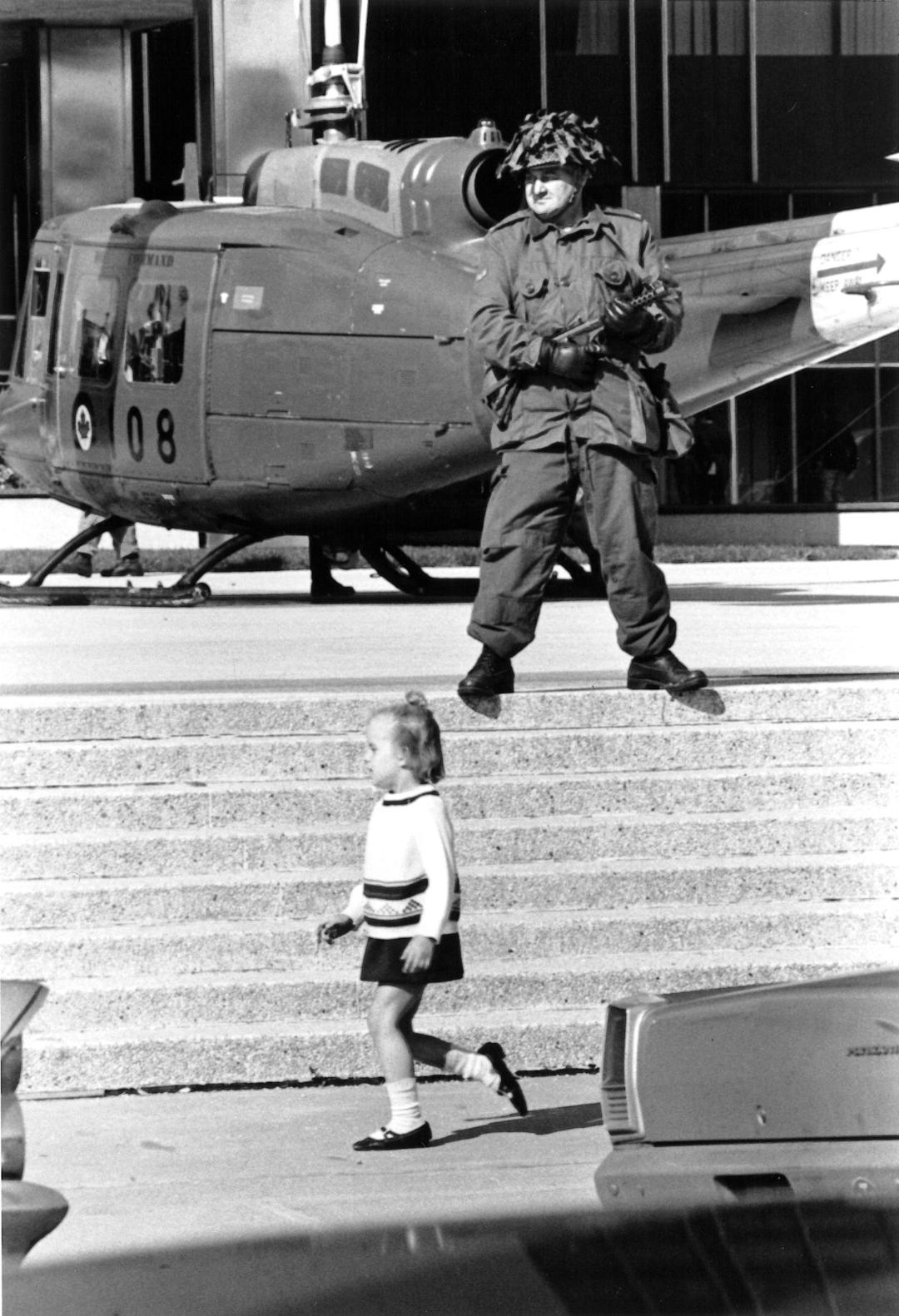Remembering the October Crisis of 1970
A time of many devastating firsts for Montreal and Canada, fuelled by kidnappings and murders by the FLQ's terrorist cell and a historic security crackdown that tested a nation's resilience and values.
 A soldier and child on October 18, 1970, during the October Crisis. | Photograph: Library and Archives Canada (PA-117477)
A soldier and child on October 18, 1970, during the October Crisis. | Photograph: Library and Archives Canada (PA-117477)Let's take a journey for a moment to Montreal in the fall of 1970.
Back then, we were a city gripped by the specter of separatism and political turmoil, in a period that brought Montreal, Quebec, and Canada to the brink of a crisis that would test the very foundations of society.
The October Crisis of 1970 placed Montreal squarely in the crossfire of political upheaval, radical separatism, and government response. It was a time when citizens witnessed the erosion of civil liberties in the name of security and the tragic loss of a prominent political figure.
Changing tactics and escalation
From 1963 to 1970, the Front de libération du Québec (FLQ), influenced by anti-colonial and communist movements in other parts of the world, particularly Algeria and Cuba, had committed over 160 violent actions—bombings, bank hold-ups, kidnappings, and murder by gunfire—before the self-described revolutionary movement changed tactics.
The stage was set on October 5, 1970, when four men from the FLQ posing as deliverymen brazenly kidnapped British trade commissioner James Richard Cross as he was leaving his luxurious Montreal residence for work.
The FLQ's demands were clear: They wanted 23 prison inmates, all deemed political prisoners, to be released, and to have their manifesto broadcasted on national television. The Trudeau government attempted to suppress its circulation, but reluctantly all French- and English-speaking media outlets in Quebec broadcast the manifesto on October 8.
Part of it read:
"We have had enough of promises of work and prosperity, while in fact, we will always be the diligent servants and bootlickers of the big shots. We will be slaves until Quebecers, all of us, have used every means, including dynamite and guns, to drive out these big bosses of the economy and of politics, who will stoop to any action, however base, the better to screw us."
Sharing the manifesto's fiery rhetoric, heavy theoretical leanings of previous FLQ manifestos, and criticism of the elite with advocacy for violence to drive them out of the province didn't satiate the FLQ, however.
Intensification
Five days after the Cross kidnapping, they struck again, this time abducting Quebec's Minister of Labour Pierre Laporte on October 10 after finding his address in the phone book. The following day, the CBC broadcasted a letter from Pierre Laporte from captivity to the Premier of Quebec, Robert Bourassa. After that, troops from the Royal 22e Régiment were sent out to guard federal property in the Montreal region.
The following day, CBC reporter Tim Ralphe questioned Trudeau at the Parliament Buildings' front entrance, expressing concern about the heavy military presence in Montreal.
“Yes, well there are a lot of bleeding hearts around who just don’t like to see people with helmets and guns. All I can say is, go on and bleed, but it is more important to keep law and order in the society than to be worried about weak-kneed people,” replies Trudeau.
Ralphe asked Trudeau how far he was willing to go.
“Well, just watch me.”
The atmosphere in Montreal turned from unease to panic, as the FLQ's actions seemed to suggest they were a formidable, organized force.
The FLQ's lawyer Robert Lemieux organizes 3,000 students in a rally in Paul Sauvé Arena in Rosemont to show support for the FLQ.
The trade union leader Michel Chartrand announces that FLQ support is rising and states: "We are going to win because there are more boys ready to shoot members of Parliament than there are policemen."
The rally frightens many and is viewed as a possible prelude to outright insurrection in Quebec. The pressure on Premier Robert Bourassa was mounting, and he turned to Ottawa for help.
On October 16, 1970, then Prime Minister Pierre Trudeau made a momentous decision by invoking the War Measures Act. This drastic move allowed the suspension of basic civil rights, granting the police the authority to conduct searches and arrests without warrants, and detain individuals without charges or access to a lawyer.
It was the first time in Canadian history that the War Measures Act was employed during peacetime.
All told, the police arrested 453 people under the Act, including prominent figures like Quebec singer Pauline Julien and leftist journalist Gérald Godin. 435 of them were released without being charged.
The arrests left a lasting mark on Montreal's psyche and the broader Canadian consciousness: The erosion of civil liberties and rights, fear and anxiety, political and social polarization, and the beginning of a damaging historical legacy.
Taking a dark turn
After having held Pierre Laporte for a week, on October 17, an FLQ communiqué led the police to Laporte's lifeless body in the trunk of an abandoned car near the Saint-Hubert airport. The event marked the first political assassination in Canada in over a century.
The Liberation Cell holding James Cross sent a communiqué with demands:
- The publication of the FLQ manifesto
- The release of 23 "political prisoners"
- An airplane to either Cuba or Algeria
- A "voluntary tax" of $500,000 loaded aboard the plane prior to departure
- The re-hiring of the "gars de Lapalme", 600 former employees of a private contractor who delivered mail in Montreal, followed by being told to eat shit by the Prime Minister
- The name of the informer who had sold out the FLQ activists earlier in the year
By 20 October, police had conducted 1,628 raids in addition to intensified investigations and intelligence-gathering efforts. This lead to the identification and arrest of key FLQ figures.
With Laporte's death, public sentiment began to shift away from the FLQ, and the calls for decisive action grew stronger. On November 6, Bernard Lortie—a member of the FLQ's Chénier Cell aka the South Shore Gang—was arrested following a raid on an apartment in Côte des Neiges, with members Paul Rose, Francis Simard and others were captured in the following weeks, tried, and sentenced for their crimes.
Despite the reputation that the FLQ had cultivated, it was revealed that the organization was far smaller than initially believed, consisting of no more than thirty-five members. The crisis was an eye-opener and showed that the FLQ's influence was disproportionate to their actual numbers.
Negotiations between the authorities and the FLQ led to the release of James Cross on December 3 after being held for 62 days. Five of his known kidnappers—Marc Carbonneau, Yves Langlois, Jacques Lanctôt, Jacques Cossette-Trudel and his wife, Louise Lanctôt—are granted safe passage to Cuba by the Canadian government following approval by Fidel Castro. Over time, all returned to Quebec and were tried and convicted.
Troops are withdrawn by January 5, 1971. Three members of the Chénier Cell were still at large—Paul Rose, Jacques Rose, and Francis Simard—and are arrested after being found hiding in a 6m tunnel in the rural farming community of Saint-Luc, about 35km southeast of Montreal. They were charged with the kidnapping and murder of Pierre Laporte.
With the Montreal Police anti-terrorist unit's informants within the FLQ organization, the FLQ's activities ceased between October 4 and 5, 1971, and Montreal began the process of healing and recovery.
Fragility of liberties
Looking back at the October Crisis of 1970, Montreal was a city caught in an incomparable time of political upheaval, radical separatism, and government response. It was a time when citizens witnessed the erosion of civil liberties in the name of security and the tragic loss of a prominent political figure. The October Crisis serves as a reminder of the fragility of civil liberties and the far-reaching consequences of political violence.
The October Crisis serves as a reminder of the fragility of civil liberties and the far-reaching consequences of political violence, leaving an indelible mark on the city's history and its relationship with the rest of Canada.


![The Bulletin: All the leaves are brown [Issue #49]](/_next/image?url=https%3A%2F%2Fthemain.ghost.io%2Fcontent%2Fimages%2F2023%2F11%2Fmontreal_391482844_343692048112553_3283613647416735409_n.jpeg&w=640&q=75)





